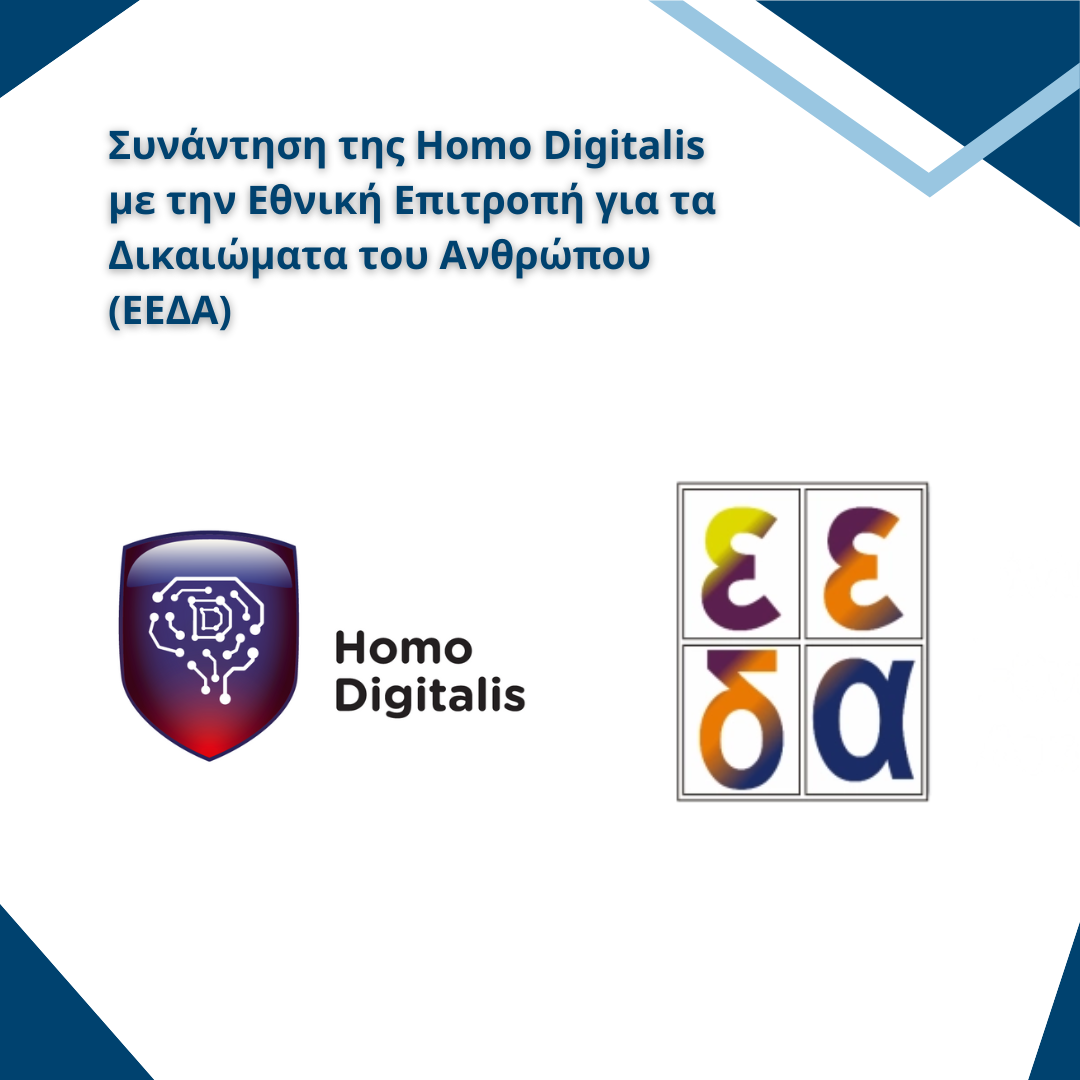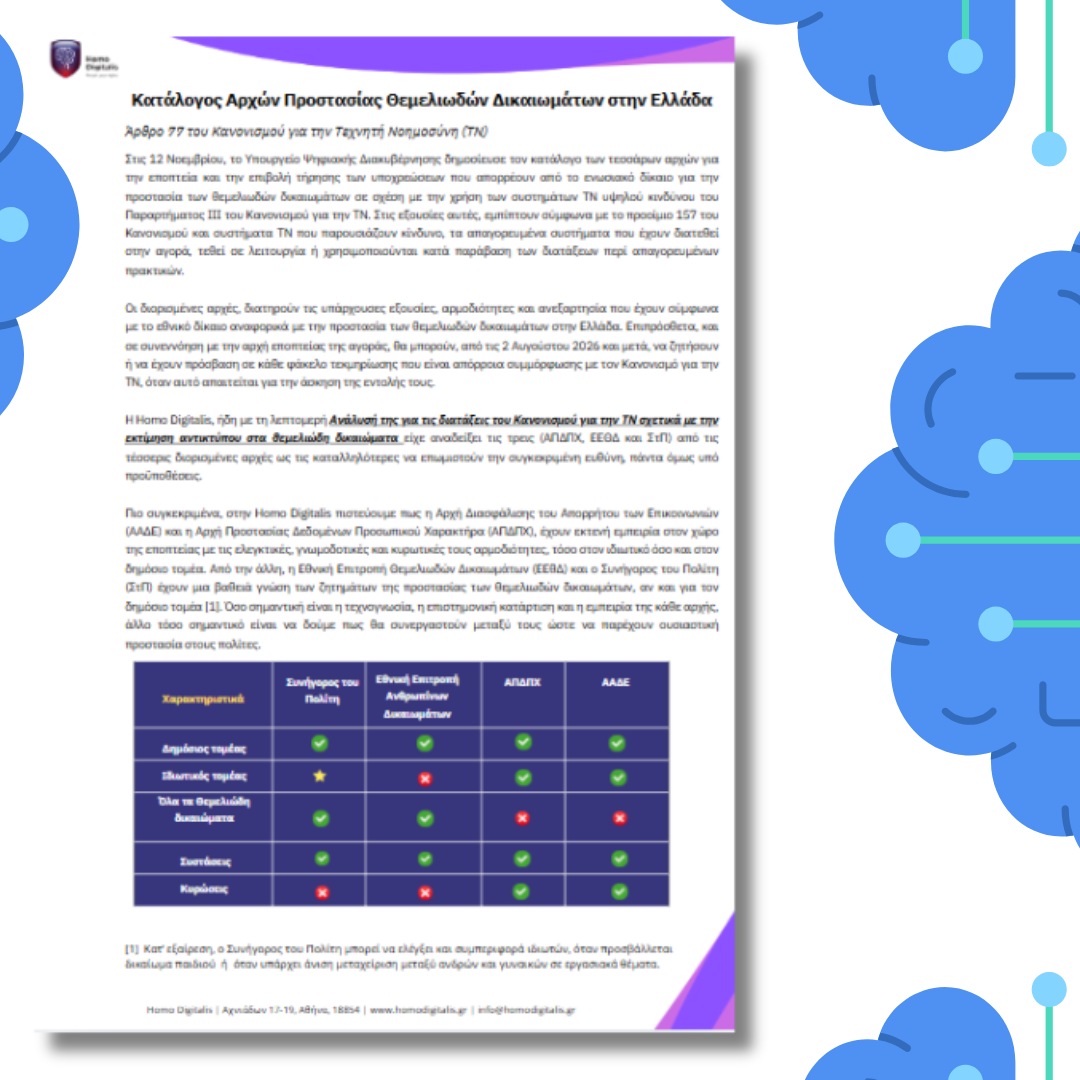Homo Digitalis meets with the Greek Ombudsman
he Greek Ombudsman welcomed the non-profit organization Homo Digitalis to his offices on June 26, 2025, for a meeting on issues related to digital rights and artificial intelligence. Among other topics, the discussion addressed the role of the Ombudsman under the European Union’s Artificial Intelligence Act, following his designation as one of the fundamental rights authorities under Article 77 of the Regulation.
We warmly thank the Honorable Greek Ombudsman, Mr. Andreas Pottakis, for his time and availability.
Participating in the meeting was Homo Digitalis Co-founder and Executive Director Eleftherios Chelioudakis.
Homo Digitalis meets with the Hellenic Data Protection Authority
The Hellenic Data Protection Authority (HDPA) welcomed the non-profit organization Homo Digitalis to its offices on May 30, 2025, for a meeting on issues related to digital rights, personal data protection, and artificial intelligence. Among other topics, the discussion covered recent developments in the field of new technologies, relevant cases and requests we have submitted before the Authority, as well as the role of the HDPA under the European Union’s Artificial Intelligence Act, following its designation as one of the authorities under Article 77 of the Regulation (Powers of the authorities for the protection of fundamental rights).
Participating in the meeting were Homo Digitalis Co-founder and Executive Director Eleftherios Chelioudakis and Homo Digitalis Director of Human Rights and Artificial Intelligence Lamprini Gyftokosta.
Homo Digitalis meets with the National Commissioner for Human Rights (NCHR)
The Greek National Commission for Human Rights (GNCHR) welcomed the NGO Homo Digitalis to its offices on May 13, 2025, for a meeting focused on digital rights and artificial intelligence.
Among other topics, the discussion covered recent developments in the field of emerging technologies, the EU Artificial Intelligence Act and its implementation, as well as the role of the GNCHR under the Regulation, following its designation as one of the authorities referred to in Article 77 (Powers of Fundamental Rights Monitoring Authorities).
Participants in the meeting included Professor Maria Gavouneli, President of the GNCHR, Elli Varchalama, Second Vice-President of the GNCHR, Dr. Christos Tsevas, Special Scientist, Eleftherios Chelioudakis, Co-Founder and Executive Director of Homo Digitalis and Lambrini Gyftokosta, Director of Human Rights & Artificial Intelligence at Homo Digitalis.
Article 77 of the AI Act: 6 months after the designation of the Fundamental Rights Authorities
On the first official deadline set by the Artificial Intelligence Regulation (AI Act), it required member states to appoint one or more authorities in accordance with Article 77 for the protection of fundamental rights by November 2, 2024.
Today, May 2, 2025 — six months after the deadline — 25 out of the 27 European countries have appointed a total of 210 authorities, a number that seems staggering and at the same time sends a strong message about how seriously these countries take the issue of fundamental rights. But does it reflect reality?
With this brief study, we aim to provide answers to the following questions:
What is the purpose of Article 77 of the AI Regulation?
Which authorities have been appointed by the member states to date?
What powers does the AI Regulation actually grant to these regulatory authorities, and what obligations arise from Article 78 of the AI Regulation regarding the confidentiality of information?
Who are the four national authorities that have taken on this role, what are their existing and new powers under the AI Regulation?
Through a case study, our Director on Fundamental Rights and AI, Lamprini Gyftokosta, attempts to explore how these authorities will cooperate, while also raising some questions that will undoubtedly concern us over time.
You can read our study here (EL).
We are actively involved in the enforcement of the AI Act in Greece
On Tuesday 12 November, the Ministry of Digital Governance published the list of national authorities and bodies that enforce or supervise compliance with EU obligations to protect fundamental rights under Article 77 of the AI Regulation, appointing the Hellenic Authority for Communication Security and Privacy (ADAE), the Greek Data Protection Authority (DPA), the Greek National Commission for Human Rights (GNCHR) and the Greek Ombudsman (Ombudsman).
Already on 25 October, Homo Digitalis with its study “Analysis and proposals for the incorporation of the provisions on fundamental rights impacts assessment of the AI Act in Greece” had developed in detail its position on this issue and the related provisions.
If you did not have time to read the full text of our study, we have prepared a one-page summary of the National Fundamental Rights Authorities here.
We underline that this publication by the Ministry of Digital Governance was both the first obligation for the implementation of the AI Act at the national level and the first step in the creation of an effective national AI governance and oversight system. A second and most important obligation is that of the institutional design of the market surveillance authorities which, according to Article 113(b) of the AI Regulation, should be completed by August 2, 2025. By then, the notifying authorities should also be appointed.
Homo Digitalis has been researching this issue for months now and we will soon publish our detailed analysis!
Our purpose? To assist decision makers with our expertise in the relevant issues, as well as to equip other Civil Society organizations in Greece with arguments and knowledge!




